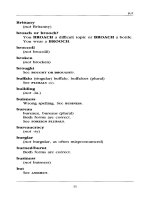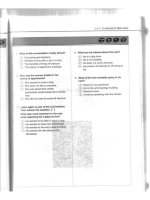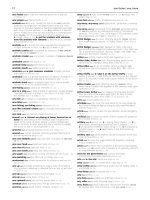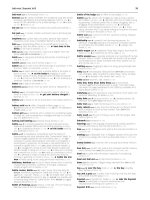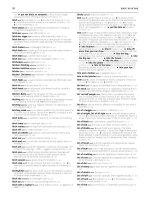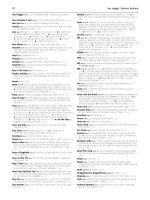Correct english part 4 pot
Bạn đang xem bản rút gọn của tài liệu. Xem và tải ngay bản đầy đủ của tài liệu tại đây (119.24 KB, 10 trang )
attach attached, attaching, attachment (not -tch)
audible (not -able)
audience (not -ance)
aural or oral? AURAL refers to the ears and hearing.
ORAL refers to the mouth and speaking.
In speech these words can be very
confusing as they are pronounced
identically.
authoritative (not authorative)
autobiography or An AUTOBIOGRAPHY is an account of
biography? his or her life by the author.
A BIOGRAPHY is an account of a life
written by someone else.
automaton (singular) automata, automatons (plural)
See
FOREIGN PLURALS.
avenge or revenge? The words are very close in meaning but
AVENGE is often used in the sense of just
retribution, punishing a wrong done to
another.
Hamlet felt bound to AVENGE his father’s
death.
REVENGE is often used in the sense of
‘getting one’s own back’ for a petty
offence.
averse See
ADVERSE or AVERSE?.
awkward Notice -wkw The spelling itself looks
awkward!
axis (singular) axes (plural)
See
FOREIGN PLURALS.
AXIS
23
TEAMFLY
Team-Fly
®
B
babyhood (not -i-)
This word is an exception to the -y rule.
See
ADDING ENDINGS (iii).
bachelor (not -tch-)
bacillus (singular) bacilli (plural)
See
FOREIGN PLURALS.
bacterium (singular) bacteria (plural)
See FOREIGN PLURALS.
badly This word is often carelessly positioned
with disastrous effects on meaning.
See
AMBIGUITY (iii).
banister/bannister banisters, bannisters (plural)
Although the first spelling is more widely
used, both spellings are correct.
bargain (not -ian)
basically basic + ally (not basicly)
batchelor Wrong spelling. See
BACHELOR.
bath or bathe? Use these exemplar sentences as a guide:
IhaveaBATH every morning (= I have
a wash in the bath).
I BATH thebabyeveryday(=washina
bath).
I have had a new BATH fitted.
We BATHE every day (= swim).
BATHE the wound with disinfectant
(= cleanse).
We have a BATHE whenever we can
(= a swim).
beach or beech? Use these exemplar sentences as a guide:
Budleigh Salterton has a stony BEACH.
BEECH trees shed their leaves in autumn.
24
beautiful Use your knowledge of French beau to
help you.
before (not befor)
begin Note these forms and spellings:
I begin, I am beginning.
I began, I have begun.
beginner (not -n-)
beige (not -ie-)
See
EI/IE SPELLING RULE.
belief (not -ei)
See
EI/IE SPELLING RULE.
believe believed, believing, believer
See EI/IE SPELLING RULE.
See
ADDING ENDINGS (ii).
benefit benefited, benefiting
It is a common mistake to use -tt
berth or birth? Use these exemplar sentences as a guide:
We have a spare BERTH on our boat.
We are proud to announce the BIRTH of
adaughter.
beside or besides? Use BESIDE in the sense of next to, by
the side of:
Your glasses are BESIDE your bed.
May I sit BESIDE you?
Use BESIDES in the sense of also, as well
as:
BESIDES, I can’t afford it.
BESIDES being very clever, Ann also
works hard.
between See
AMONG OR BETWEEN?.
between you and I Incorrect. Write: between you and me.
See
PREPOSITIONS.
BETWEEN YOU AND I
25
bi- This prefix means ‘two’.
Hence bicycle
bifocals
bigamy, and so on.
Note, however, that some words
beginning with ‘bi’ can be ambiguous.
See
BIMONTHLY and BIWEEKLY.
See also
BIANNUAL OR BIENNIAL?.
biannual or biennial? BIANNUAL means twice a year (not -n-).
BIENNIAL means every two years (a
biennial festival) or lasting for two years
(horticultural, etc). (not -ual)
bicycle bi + cycle
(not bycycle or bycicle)
bidding or biding? bid + ing = bidding
The BIDDING at the auction was fast and
furious.
BIDDING farewell, the knight cantered
away.
bide + ing = biding.
Her critics were just BIDING their time.
See
ADDING ENDINGS (i) and (ii).
biege Wrong spelling. See BEIGE.
biennial See
BIANNUAL OR BIENNIAL?.
bimonthly Avoid using BIMONTHLY as it has two
conflicting meanings. It can mean both
every two months and also twice a
month. (Compare
BIWEEKLY.)
binoculars (not -nn-)
biography See
AUTOBIOGRAPHY OR BIOGRAPHY?
biscuit (not -iu-)
biulding Wrong spelling. See
BUILDING.
bivouac bivouacked, bivouacking
See
SOFT C AND SOFT G.
BI-
26
biweekly This word has two conflicting meanings
and is perhaps best avoided. It can mean
both every two weeks (i.e. fortnightly)
and also twice a week. (Compare
BIMONTHLY.)
bizarre (not -zz-)
blond or blonde? BLOND is used to describe men’s hair.
BLOND is used to describe women’s hair.
A BLONDE is a woman.
board or bored? A BOARD is a piece of wood, also a
committee or similar group of people.
To BOARD means to get on (train, etc.)
and also to pay for living in someone’s
house and having food provided.
BORED means uninterested.
boarder or border? A BOARDER is a person who pays to live
in someone’s house.
A BORDER is the edge or boundary of
something.
boisterous (not boistrous, although often
mispronounced as two syllables)
boney/bony Both spellings are correct, although the
second spelling is more commonly used.
border See
BOARDER OR BORDER?.
bored See
BOARD OR BORED?.
bored by, bored with (not bored of)
born or borne? Use these exemplar sentences as a guide:
Dickens was BORN in Portsmouth.
She has BORNE five children.
He has BORNE a heavy burden of guilt all
his life.
borrow or lend? May I BORROW your pen? (= use your
pen temporarily)
Please LEND me your pen. (= pass it to
me and allow me to use it)
BORROW OR LEND?
27
both . . . and Take care with the positioning of each
half of this paired construction. Each must
introduce grammatically similar things:
He is BOTH clever AND hardworking.
(not: He both is clever and hardworking!)
He BOTH paints AND sculpts.
He bought BOTH the gardening tools
AND the DIY kit.
Notice, however, the ambiguity in the last
example. It could mean that there were
just two gardening tools and he bought
both of them. In the case of possible
confusion, always replace:
He bought the gardening tools and also
the DIY kit.
He bought the two gardening tools and
also the DIY kit.
He bought both of the gardening tools and
also the DIY kit.
bought or brought? BOUGHT is the past tense of to buy.
She BOUGHT eggs, bacon and bread.
BROUGHT is the past tense of to bring.
They BROUGHT their books home.
bouncy (not -ey)
See
ADDING ENDINGS (ii).
brackets Round brackets enclose additional
information which the writer wants to
keep separate from the main body of the
sentence.
Jane Austen (born in 1775) died in
Winchester.
My neighbour (have you met her?) has
won £250,000.
Notice how sentences in brackets are not
fully punctuated.
BOTH AND
28
They don’t begin with a capital letter or
have a full stop at the end if they occur
within another sentence as in the example
above. They do, however, have a question
mark or an exclamation mark, if
appropriate.
Square brackets indicate the material has
been added to the original by another
writer:
When I [Hilaire Belloc] am dead, I hope it
may be said:
‘His sins were scarlet, but his books were
read.’
breath or breathe? BREATH is the noun, and rhymes with
‘death’.
He called for help with his dying
BREATH.
BREATHE is the verb and rhymes with
‘seethe’.
BREATHE deeply and fill those lungs!
brief, briefly (not -ei-)
Britain (not -ian)
Brittany (not Britanny)
broach or brooch? You BROACH adifficulttopicor
BROACH abottle.
You wear a BROOCH.
broccoli (not brocolli)
broken (not brocken)
brought See
BOUGHT OR BROUGHT?.
buffalo (singular) buffaloes (plural)
See
PLURALS (iv).
building (not -iu-)
buisness Wrong spelling. See
BUSINESS.
BUISNESS
29
bureau bureaux, bureaus (plural)
Both forms are correct.
See
FOREIGN PLURALS.
bureaucracy (not -sy)
burglar (not burgular, as often mispronounced)
burned/burnt Both forms are correct.
business (not buisness)
but See
AND/BUT.
buy/by Use these exemplar sentences as a guide:
IneedtoBUY some new jeans.
The book is BY Charlotte Bronte
¨
.
Wait BY the gate.
The children rushed BY.
BUREAU
30
C
cactus (singular) cactuses or cacti (plural)
See
FOREIGN PLURALS.
caffeine (not -ie-)
-cal/-cle Adjectives end in -cal.
Nouns end in -cle.
e.g. critical article
logical bicycle
magical circle
musical cubicle
nautical cuticle
physical miracle
practical particle
theatrical spectacle
tropical uncle
whimsical vehicle
calculator (not -er)
calendar
calf (singular) calves (plural)
See
PLURALS (v).
callous or callus? CALLOUS means cruel, insensitive, not
caring about how others feel.
CALLUS means a hard patch of skin or
tissue.
Interestingly, skin may be CALLOUSED
(made hard) or CALLUSED (having
calluses).
can or may? Strictly speaking, CAN means ‘being able’
and MAY means ‘having permission’. It is
best to preserve this distinction in formal
contexts. However, informally, CAN is
used to cover both meanings:
31
You CAN go now (= are permitted).
caning or canning? cane+ing=caning
CANING is now banned in all schools.
Can + ing = canning
The CANNING factory is closing down.
(See
ADDING ENDINGS (i) and (ii).)
canister (not -nn-)
cannon or canon? A CANON is a cleric.
A CANNON is a large gun.
cannot or can not? Both forms are acceptable but the second
is rarely seen.
canoe canoed, canoeing, canoeist
See
ADDING ENDINGS (ii).
canon See
CANNON OR CANON?.
can’t Contraction of CANNOT.
canvas or canvass? CANVAS is a rough cloth.
To CANVASS is to ask for votes.
capital letters Use a capital letter in these circumstances:
" to begin a sentence:
My father will be fifty tomorrow.
" to begin sentences of direct speech:
‘You will be sorry for this in the
morning,’ she said.
She said, ‘You will be sorry for this in
the morning. You never learn.’
" for the pronoun ‘I’ wherever it comes
in the sentence:
You know that I have no money.
" for all proper nouns – names of:
people (Mary Browne)
countries (Malta)
CANING OR CANNING?
32
